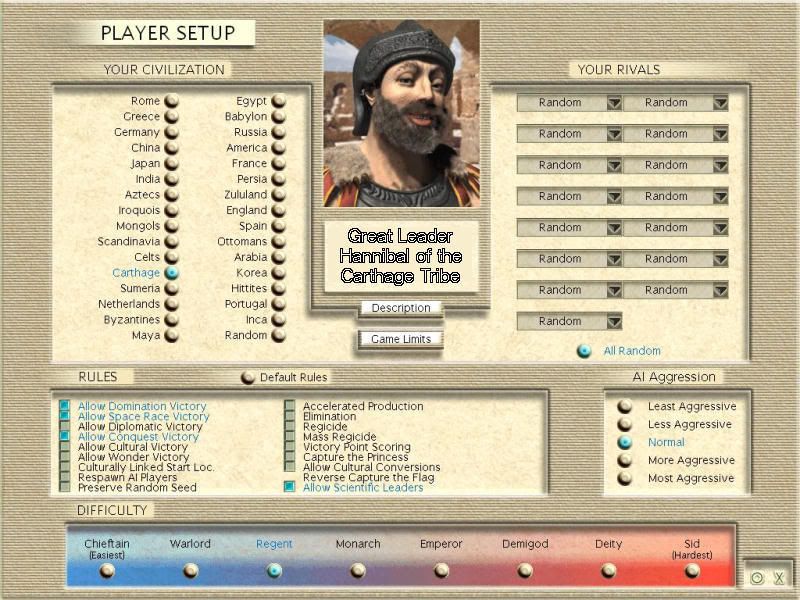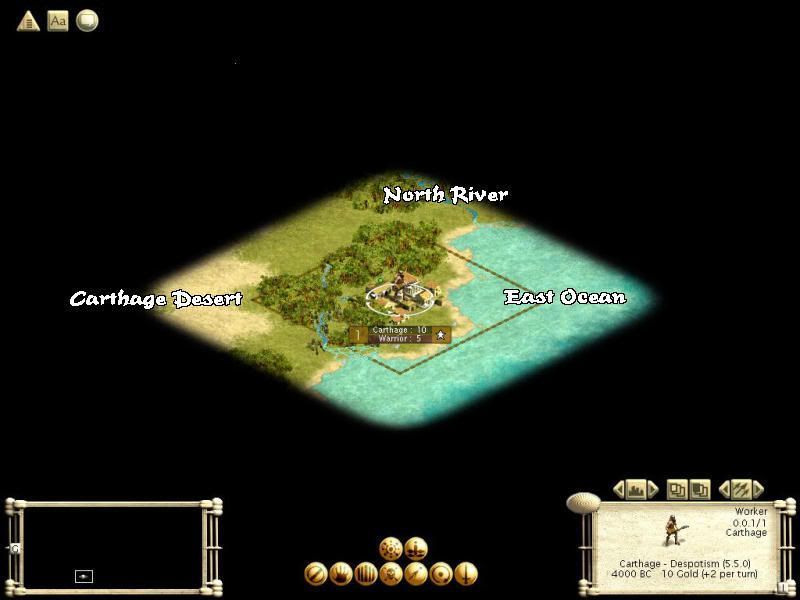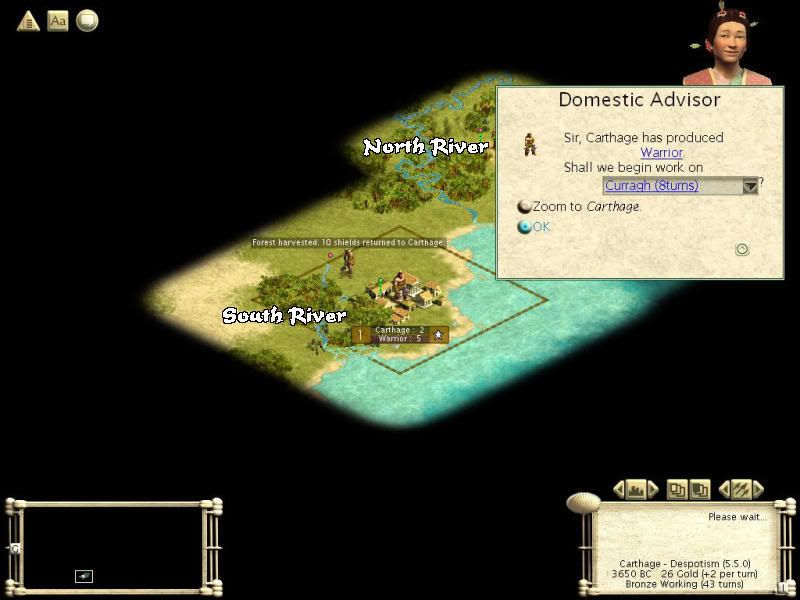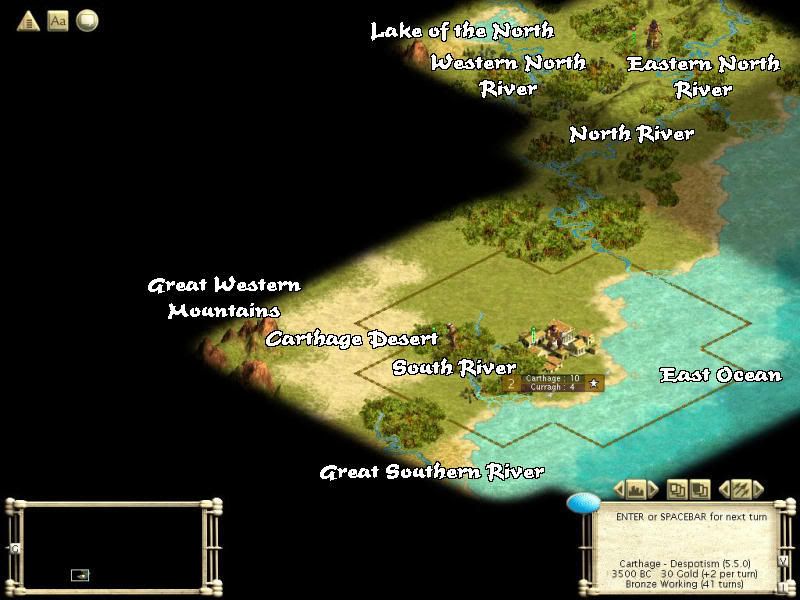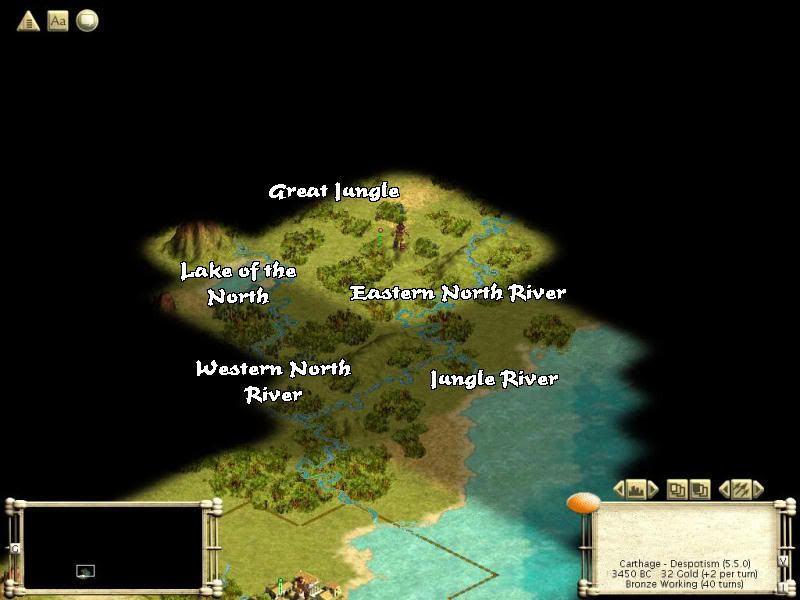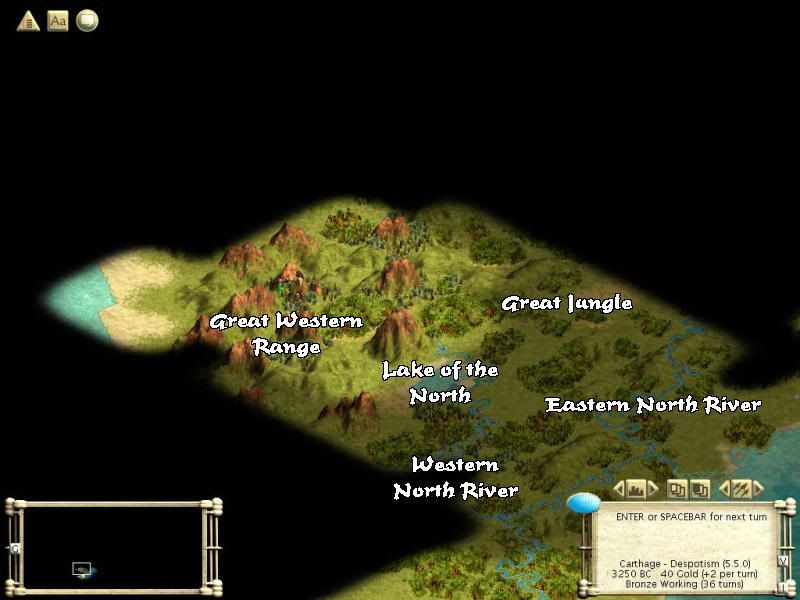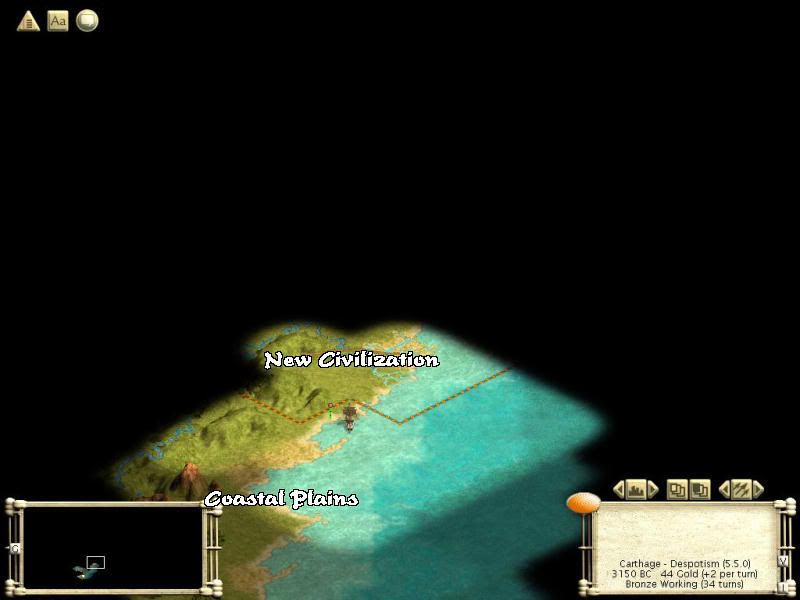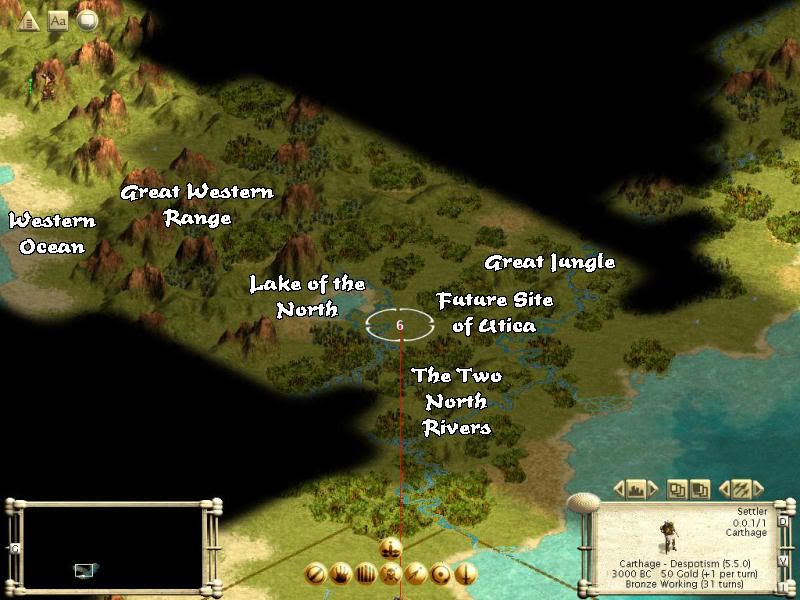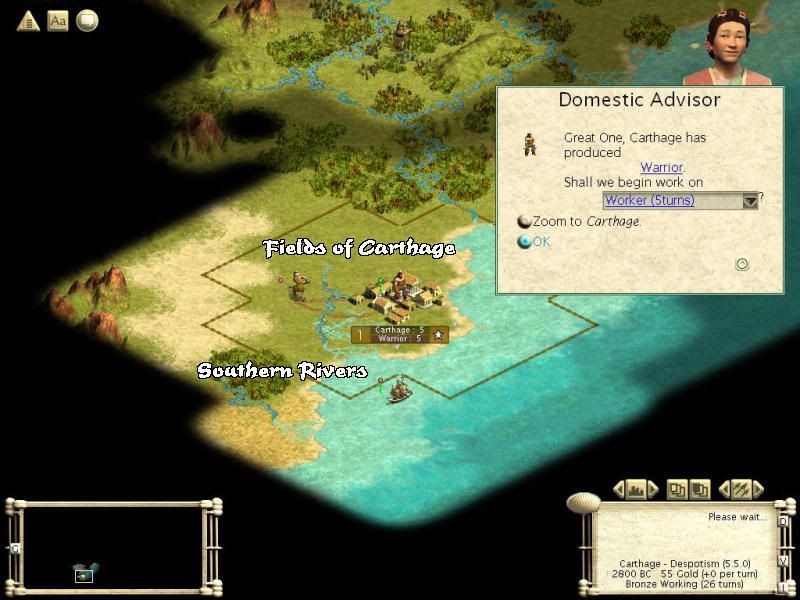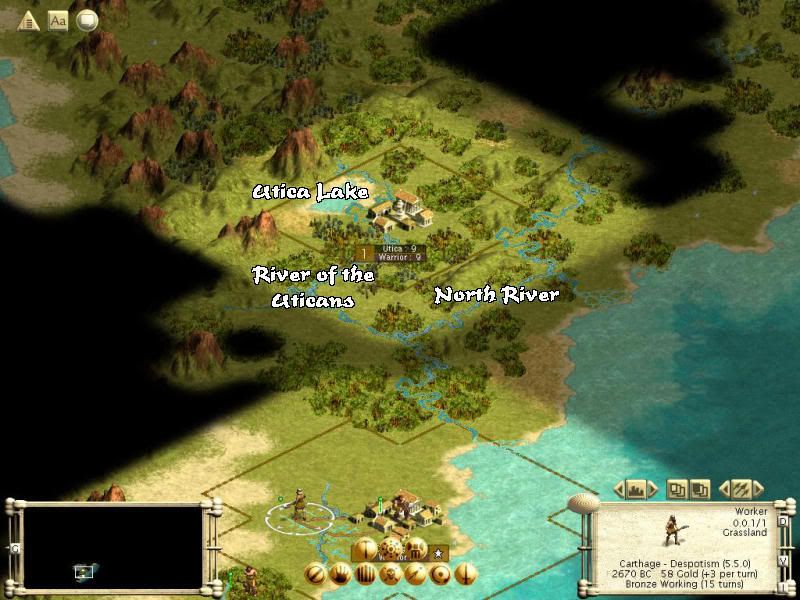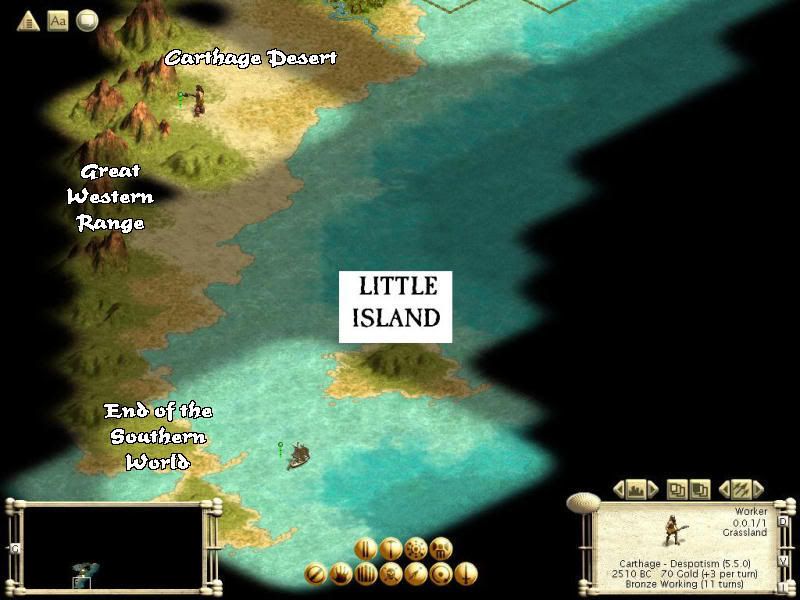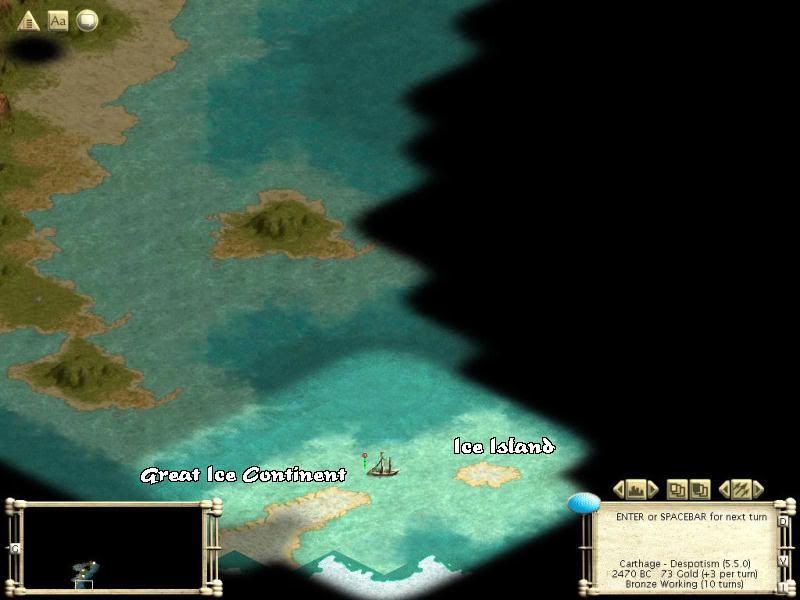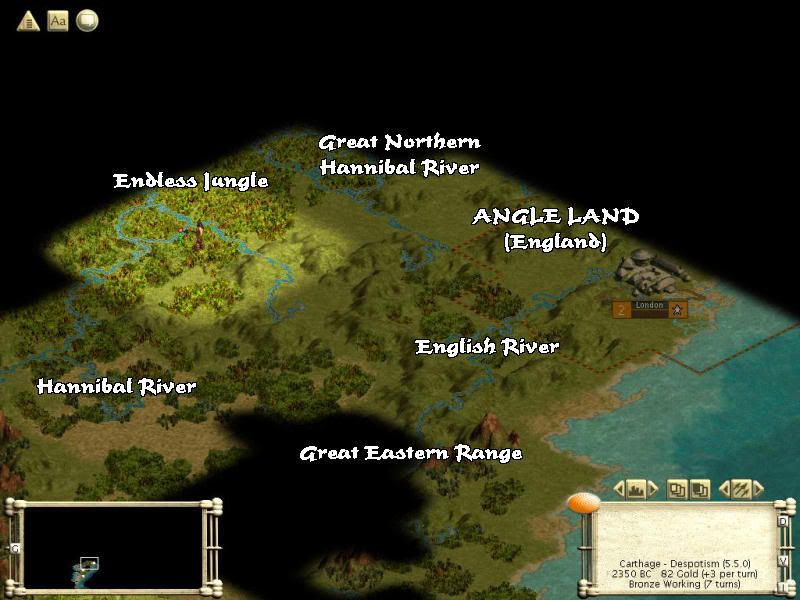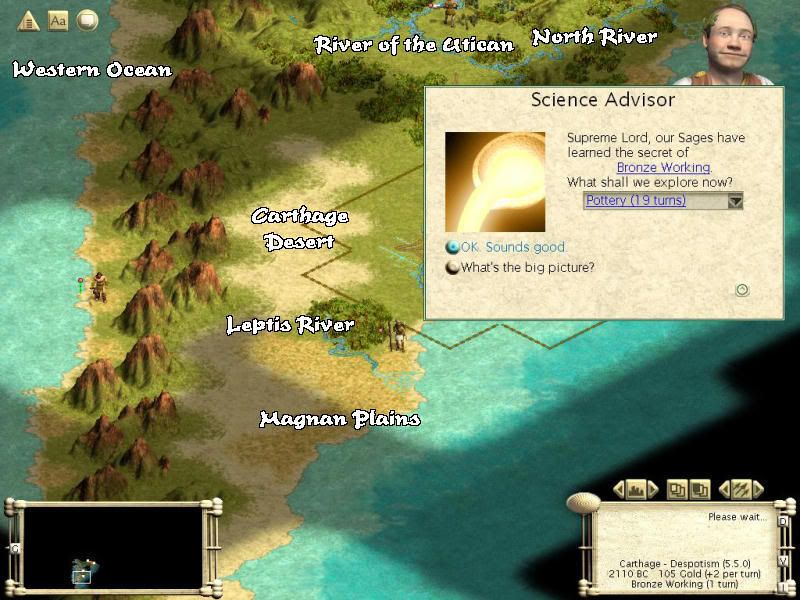Chapter 1
The Origin of Carthaginian Society
The Year 4000 BC. After tens of thousands of years of migrating, a loosely bonded group of nomads bands together to form the Tribe of Carthage. After realizing that there was no point in wandering as a group if they weren't going to settle on the endless plains, they founded the city of Carthage.
Carthage was not in a very ideal position, as it was surrounded by thick, dense jungle on all sides. Where there was no jungle, there was the East Ocean blocking the way.
Through previous knowledge of the time when they wandered the land, they knew of the great desert to the west, which they named as the Carthage Desert. From rickity rafts and travellers who accidently stumbled upon the city, they learned of a northern river with they named North River. And to the south, the Southern River.
The inhabitants of Carthage banded together and decided what to do next. Should they build fierce warriors, to conquer the lands throughout the region, or should they improve their own land with a worker. They decided on the latter, and chose to train a group of soldiers for future defending of their town.
In a desolate corner of the Town Square, there was a very plain building. It was the home of the Sacred Prophets, who learned secrets from the Gods. The prophets decided that Bronze Working would be the most useful for their fine city, and so decided to learn the advanced techniques and the sophistication to utilize it.
The local workers were hard at work clearing the dense jungle that surrounded the city of Carthage, shrouding it from any outside contact. Upon the clearances, the city built warriors and explored the northern territories, in which they further explored along the North River.
With the addition of armed forces, the townspeople's leader, Hannibal, chose to explore by sea and build the first real ship of Carthage.
Within 150 years since the decision to build a carragh, the warrior-explorer discovered much of what was north of Carthage. They were dissapointed to find more jungle, but elated at the rumors and tales of a magnificent lake, which was rightfully named Lake of the North.
Great Leader Hannibal, however, was excited at the fact that the North River was longer than previously imagined, and at the discovery of a great southern river in the south.
To the west, the Great Western Mountains blocked any convenient passageway, but had shown the approximate size of the Carthage desert, and it was quite small. Hannibal, however, hoped that the mountanis didn't go on and on.
The Great Leader Hannibal sent the warrior further North, where he found even more jungle. But, there seemed to be a sign of the end of the jungle as a flat plain was spotted ahead. Hannibal was also amazed that there was no apparent end to the Great River and of a new river, the Jungle River, which came forth from the Great River spilling into the East Ocean.
Back at home, the first sailiors were getting ready to set aboard the brand new carragh, which was expected to travel the seas to find even more abundant land than the jungle to the north.
With this, Hannibal found his capital city crowded and found the need to build a settler to give birth to another Carthagianian town. He made plans, but there were to take many years to assemble.
To the north, the band of warrior-explorers kept on going north, but upon their own decisions, decided to see what was to the west of them. At first, there was dismay as to the seemingly endless mountain range, appropiately named as Great Mountain Range, and found a new source of water from the peak of Mount Hannibal. Perhaps it was a huge river, or even better, a grand lake? The warriors headed west to check it out.
As the warrior headed west, the curragh was heading north. What they found though, was nothing Hannibal expected. Within these lands, he heard, lived another civilization, almost as civilized as Carthage itself! Hannibal was amazed, and told his ship to go forward immediately.
Before the ship went much further, they were greeted by the Despot Elizabeth. She was rather pale and frail, but the sailors saw that she was no one to mess with. They greeted her, and set off down south.
Hannibal saw two oppurtunities: to conquer these people, or to become trading partners, and maybe someday, allies.
At home, the group of new settlers had been organized in Carthage. They were to head north, to found the city of Utica. Utica was to be set next to the mysterious and magical Lake of the North, and so the new settlers were considered very high regarded.
One day in Carthage a young man named Toynbee came by. He was different than the Carthagianians, and spoke no Carthagianian at all. He came by, and studied people's faces. Eventually Hannibal sent him off, and he was never seen again for forty years.
But, he came back on the forty-first year since his departure. He came with a scroll, which spoke of the happiest nations in the world. Hannibal scoffed at him? Egyptians? Sumerians? There were no such people in the world so Hannibal sent him off for the second time.
A third warrior was made now in Carthage, so the despot Hannibal told the city to produce another warrior. And, so they did.
Hannibal also noticed that where there once was a great jungle, so thick, and dense, and green, was no beautiful flowery fields. He decided to name it the Fields of Carthage.
And noticing the Southern River's potentials, he began to irrigate the lower South River.
In the 2500s, news began to report that the settler was either nearing it's location, or already there. Hannibal sent a messenger to check up on them and found that they had founded the City of Utica, where he had told them. He rewarded their obedience with the renaming of Lake of the North to Utica Lake and West Great River to River of the Uticans. The great mountain on the otherside of the lake was also to be named Utica Mountain.
Yet another warrior was trained, so he set about after his success with the Utican settlers: he was going to train another group of them.
By this time, there was a warrior exploring the south of Carthage. What he found was quite depressing. South of the lush jungle of the Great Southern River was dry, towering mountains or barren desert, with few exceptions on the coast. The coast was going to be a good city spot for future Carthagianian cities.
The curragh had turned south many years ago after discovering the nation of England. Now, it made another great discovery of an island, which was named the Little Island. It was to be settled some other time, but the mainland was first priority.
The little ship had also discovered the end of the great landmass, and it was so named the End of the Southern World, as all things south of Carthage was considered the Southern World.
Few years ahead the curragh had made an even bigger discovery than Little Island. Beyond the southern tip of the Southern World, lie a frozen landmass! It was deemed useless for now, as it was a ice wasteland, as was the little Ice Island slightly more north of the Great Ice Continent.
Through findings through exploration and the knowledge of native peoples, Hannibal had compiled a map of the known Great Jungle, now seperated into two jungles: Great and Endless, and of known English territory. Through them both lie several rivers, and the Great Eastern Range, for there is believed to be towering mountains beyond the Mountain of the Jungle.
The planned settlers from Carthage had finished, and under Hannibal's orders, to wait a few years for instructions on where to go.
The previous Western Mountains of Carthage were found to be part of the Great Western Range, and a vast ocean, the West Ocean, lay beyond their peaks.
Hannibal decided to send the settlers down south to the Coastal Plains. The city was to be named Leptis Magna, and the river, Leptis River.
Through the thousands of years of never hearing from the prophets, Hannibal forgot about them. But, in the morning of a day in 2110 BC, they reported that they finished Bronze Working. Hannibal, surprised but still having his wits about him, told them to research pottery, which would take far less than Bronze Working had tooken.
- - - - -
So, that concludes Chapter 1. Here's some assorted information for the end of Chapter 1



